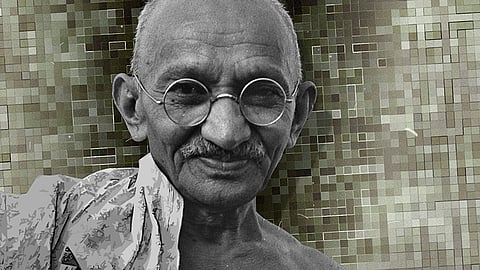
- Home
- Live Blog
- Breaking News
- Top Headlines
- Cities
- NE News
- Sentinel Media
- Sports
- Education
- Jobs

The Father of the Nation had a different perception of the role that religion could play in politics when he said famously, “If I seem to take part in politics, it is only because politics today encircles us like the coils of a snake from which one cannot get out no matter how one tries. I wish to wrestle with the snake” (Mahatma Gandhi by Romain Rolland). And as quoted by JJ Doke in MK Gandhi, the priest of non-violence, both as political philosophy and spiritual endeavour, had this to say about religion as he grappled with the ramifications of religion in politics: “By religion I do not mean formal religion or customary religion, but that religion which underlies all religions, which brings us face to face with our Maker.” It is a profound statement, reflecting on how Gandhi wanted religion to spiritualize politics, and not to create rifts and discords polluting political ambience, nor to cater to the imperatives of any vote-bank politics centred around a perverse politics of religious appeasement for cheap electoral gains as is in vogue in India – with secularism distorted to pander to ‘minorities” alone because votes must rate a priority far higher than even the integrity of the nation and its hallowed Constitution.
This takes us to the controversial letter sent by the Archbishop of Delhi, Anil Coutu, to all parish priests in the national capital that points to the “turbulent political atmosphere which poses a threat to the democratic principles enshrined in the Constitution and the secular fabric of our nation”. He has exhorted his audience thus: “It is our hallowed practice to pray for the country and its political leaders all the time but all the more so as we approach the general elections… As we look forward towards 2019 when we will have new government, let us begin a prayer campaign for our country… Protect our institutions from the infiltration of the evil forces”. Had it been simply a letter asking the Christian community in the country to pray for the welfare of the country at all times without referring to elections and without making any ambiguous reference with hidden meanings to “evil forces”, it would not have led to any controversy. But things have turned out to be different.
The Archbishop, however, has chosen to gloss over at least two fundamentals. One, it is the timing that has sparked the controversy. The pre-election phase is a time for political parties to knuckle down with new agendas to win over their constituencies, not for clergies to suddenly wake up and see “evil forces” without having to name them and be clear about what they really intend to say and convey. Lack of clarity is an antithesis when it comes to religious heads making attempts to dabble in politics in a veiled manner while attempting self-righteousness. The prayer that the Archbishop has in mind must be for all times for every single citizen in the country, and not just when general elections are approaching and “evil forces” must be defeated so that our “secular fabric” is intact. And two, some introspection becomes necessary. Where was such concern when under the UPA regime corruption had assumed a hydra-headed monstrous role and brought disrepute to the country worldwide? Were the evil forces bent on perpetrating loot on the people of the country not running berserk then? What about the Mumbai 26/11 attacks? And what about the other acts of terror savagery sparing not even women and children? When the Sonia Gandhi-led Congress, ruling the country at that time as the leader of the UPA, was failing continually to rein in the evil forces of all hues, why was there not any such call for prayer?
The bottomline is simple: When religious figures utter words of politics and at times when such words are highly vulnerable to interpretations of all sorts with people having to enjoy the right to interpret when such words fall short of specifics, they must tread the path of the venomous blend of politics and religion, bereft of spirituality but with indirect references, very carefully. By the way, who really are the “evil forces” the Archbishop has pointed to?